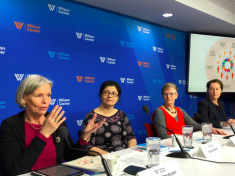-
Listen to Midwives to Achieve Universal Health Coverage by 2030
April 3, 2020 By Amanda King What is inherent in the word “universal,” is that it is for all women, said Anneka Knutsson, Chief of the Sexual and Reproductive Health Branch at the United Nations Population Fund (UNFPA), at a recent Wilson Center event on the importance of midwives in achieving universal health coverage.
What is inherent in the word “universal,” is that it is for all women, said Anneka Knutsson, Chief of the Sexual and Reproductive Health Branch at the United Nations Population Fund (UNFPA), at a recent Wilson Center event on the importance of midwives in achieving universal health coverage.What is inherent in the word “universal,” is that it is for all women, said Anneka Knutsson, Chief of the Sexual and Reproductive Health Branch at the United Nations Population Fund (UNFPA), at a recent Wilson Center event on the importance of midwives in achieving universal health coverage.
To achieve the ambitious sustainable development goal of universal health coverage, one challenge is to make sure that the women most marginalized aren’t left behind. Elena Ateva, Advocacy Manager at White Ribbon Alliance, said that in order to best support women, we need to ask them what they really need and want. And what women want differs from woman to woman depending on her beliefs, customs, gender identity, sexuality, etc. “We cannot determine policies for somebody else. We need people to be part of those processes,” said Ateva.
Midwives can play an important role in representing the needs of a community and reaching women traditional health facilities have often excluded. But, we have to be careful when thinking midwives, alone, are the answer, said Franka Cadée, President of the International Confederation of Midwives. “Midwives are part of a system.” Cadée said that while people are happy to have midwives working with patients, midwives need to also be at the decision-making table, at the ministry, and working with politicians. In the United Kingdom, a midwife serves as a medical officer to advise the Minister of Health on midwifery. To have a midwife in this high-level position allows midwives the opportunity to represent the communities they serve, as well as support the midwifery profession.
One way to elevate the status of midwifery and enact concrete change is through midwifery education. Since the early 1990s, Sweden has created 13 midwifery education programs that go beyond clinical skills. Marie Klingberg-Allvin, Midwife and Professor in Global Sexual and Reproductive Health at Dalarna University, Karolinska Institute in Sweden said it is important to have strong academic environments which include research. Understanding and contributing to research gives midwives the ability to reflect, to read new science, to be part of developing new standard guidelines in the clinic, and to be vocal and take lead for their own profession, she said.
Globally, women make up the vast majority of midwives and gender discrimination plays a role in the limited number of midwives in decision-making positions. To close the gender gap, Klingberg-Allvin said, “you need to have gender-intentional governments to start with” and you also need to have a government that gives status to sexual reproductive health and rights. Cadée said, “Midwives don’t need to be empowered; midwives are very, very powerful. Midwives simply need to be listened to.”
The World Health Organization (WHO) has designated 2020 as The Year of the Nurse and the Midwife. In celebration, the Maternal Health Initiative is publishing a series of articles to recognize the importance of these two professions towards improving maternal and women’s health outcomes and to illuminate the impact made by both nurses and midwives the world over.
Friday Podcasts are also available for download on iTunes and Google Podcasts.
 A Publication of the Stimson Center.
A Publication of the Stimson Center.

 What is inherent in the word “universal,” is that it is for all women, said Anneka Knutsson, Chief of the Sexual and Reproductive Health Branch at the
What is inherent in the word “universal,” is that it is for all women, said Anneka Knutsson, Chief of the Sexual and Reproductive Health Branch at the 

